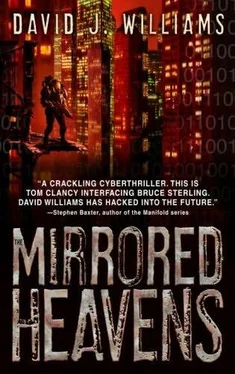It’s just like Morat said. She’s staring backward into time. She’s gazing at long-ago wreckage. The map of old Belem clicks into her head, along with all that city’s infrastructure—and the lines she’s in wind among that infrastructure, just a few wires among so many millions. Somehow these survived. Somehow they weren’t dug up. Somehow they got overlooked.
She sees why. They got disconnected, the ends sealed. But there’s still data swimming through these lines. An isolated network: and some of the data within looks legit—small-time enterprise trying to eke out existence amidst the urban chaos. But most of it’s small-time crime: porn, snuff, drugs—all the flavors of vice licking back and forth in search of download. And there’s a lot of download points, too—lot of illicit subscribers, paying for the right to get some kind of net.
This doesn’t surprise Haskell. Access to the main zone, the integrated zone—the American zone—can’t be taken for granted. Not down here. Ninety-nine percent of the population on the northern continent’s a part of it, but that number plummets the farther south you get. Meaning that those in the Latin fringes just have to make do. These zone-fragments are illegal. But as long as the Jags aren’t involved, no one cares.
But that’s the point. That’s why she’s looking at all the data set in motion by those who pay protection to the local gangs for the use of rogue systems powered by rogue generators that squat in forgotten basements and derelict rooms. That’s why she’s trying to determine what the larger pattern used to be—intimations of supply lines that once wound inland from the sea…query grids stacked along the floor…even graffiti on the walls: taglines left by bored programmers long since buried far deeper than these wires. She cruises up and down those long-gone roads. She runs up stairways, down ramps, through shafts.
And all the while, she does her best to keep it stealthy. Because she knows her eyes may not be the only ones scanning. She knows that if they’re looking, she probably won’t know it—that if they see her, she might not even guess. She might not even feel it coming either—just one bolt from the black to smack her dream-body senseless, send her meat-body flopping on the floor of the warehouse that’s so far away that she can barely remember what it was like. But that’s the nature of the recon. That’s the nature of this probe.
Which now detects something. Two things, actually. Anomalies. Each of them concealing the other. She can’t see one without seeing both. And they’re in different places. It’s a neat trick. But she’s trickier. She strips away all the history, rips out all the nonessential. She tunes out every last fragment of peripheral traffic, regards what’s left.
These anomalies aren’t data. They’re doors. They’re white where all else is black. They’re stars in the land of void. They’re lava in the land of ice. They’re different. She takes the readings, confirms them, locks in the references. She approaches those gateways. Reaches them. Looks through.
And watches as zone-shard shifts from universe to foreground.
This is no isolated fragment. She’s looking at the Jaguar net. There’s no doubt now. The contours of it show at least some of the codes her own side has captured in the past. It shows her others she’s never seen. Not to mention an expanse she never would have dreamt of. In one direction she can see something that leaps away from the city, tunneling under jungle and through mountains, all the way to what must be Lima, where it opens up to still more networks. In another direction’s Sao-Rio. She imagines those conduits: old telephone lines, cables, comlinks run beneath the floor of jungle before it all came crashing down. She can see that the place she’s been crawling in is a nexus. That the Jaguars have been using it to link their operations elsewhere with their operations in this city. She traces those links in turn and can see all the data now. The structure’s clear enough: patchwork quilt of legacy, and this place is just one thread. Belem-Macapa is just one piece. Just one limb in a stitched-together body.
So where the fuck’s the brain?
Because once she’s mapped that, she can get out. Back to Sinclair’s people. Back to the ones who put her in here. She gets the maps. They work out the vectors. And then they wipe out the Jags in one clean sweep.
Something catches her eye. New data seems to be flowing. Haskell focuses on a series of lines that carry particularly heavy traffic. Each line winds through buildings. Each terminates in what looks to be a dead end. But something’s crouching at each of those ends. Something that seems to be winding up through incremental stages of activation.
Even as she takes this in, she’s noticing the same thing going down in other cities. Sao-Rio. Greater Caracas. Japura. In each city, it’s the same: communications back and forth. Things being queried. Things responding…but what does it mean? Is this a pattern she’s just now seeing? Is something changing? Is this the key to it all? Was this happening already? She can’t figure it out.
For just another moment, she lets it clarify. During which time those nodes keep brightening. To the point where she realizes it’s not just her focus getting better. It’s not just her read on this place improving. These changes are real. They’re making her current position far too dangerous. The Jaguars could be on to her. She’s got to beat a retreat. She’s got enough to go on. She starts to withdraw.
But they move first.

Marlowe looks around. The chamber he’s in is perhaps twenty meters by another fifteen. At least one level has been cut away above it to accommodate its vaulting ceiling. Yet in all this space, it’s the center of the room that really gets Marlowe’s attention.
Because that’s where the missiles are.
Five of them. All of them protruding from a cylinder-shaped launcher that sits upon a dais. Each is about three meters long, with the green cat-skull of the Jaguars painted upon its nose cone. All around lie consoles, electronic equipment, bundles of wire. Marlowe creeps in toward the launcher. Smoke from the flames behind him is beginning to waft into the room. But he pays it no heed. He reaches that center structure and leaps forward, vaulting over it, holding his arms and guns perfectly level.
Two meters in front of where Marlowe’s just landed, a man sits cross-legged, calmly gazing up at him. The man’s skin is darker than that of any of the guerrillas Marlowe has encountered thus far. Greyish-black hair falls down around his shoulders. He regards Marlowe with a strange mixture of interest and indifference. His eyes are as black as his hair must once have been.
“Yanqui.” The voice is low. It sounds almost amused. “You were too fast for us. We thought we would have had more warning. We failed to prepare for just one man.”
The Jaguar’s stalling for time is transparent. But Marlowe needs information. This is almost certainly the man he’s charged with bringing back—but the missiles have changed the nature of the mission automatically. The man opens his mouth to speak again, but Marlowe cuts him off: “Where’d you get the missiles?”
“Missiles?” The man rises to his feet. He smiles. Marlowe’s wrists flex upon the edge of trigger. “I see no missiles. All I see are the teeth of the Great Cat.”
“The jaguar?”
“You defile its name even as you speak it, Yanqui. Just as you defile our land. Do you not recognize these weapons? When the gate to their cage is lifted, they will go faster than the wind, and they have more cunning than do mere men.”
Читать дальше













